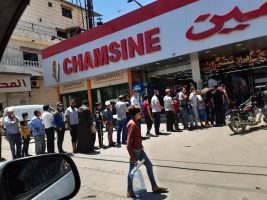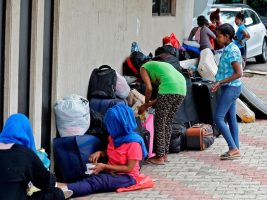
“We struggle every day with rising poverty levels. We need food, medicine and clothing items”, Father Michel Abboud, president of Caritas Lebanon, sent a cry for help from Beirut. Contacted by SIR, he described the tragic situation in the country of the Cedars, plagued by an “unprecedented economic and financial crisis, which broke out – he underlined – long before the Covid-19 pandemic” that caused 1946 reported infections and 36 deaths up to 8 July. In fact, since mid-October last year, the country has been shaken by violent protests against the government’s inability to find a solution to the crisis and to tackle a sovereign debt amounting to nearly 170% of GDP. On 29 October 2019 the protests drove the then Prime Minister Saad al-Hariri to resign. Hassan Diab was appointed as Premier in December, and last March he announced the first sovereign default in Lebanon’s history along with negotiations to restructure foreign debt talks with the International Monetary Fund (IMF). However, in the absence of reforms the negotiations are unlikely to yield results. Meanwhile, as protests continue, the economy is plummeting and the population is growing poorer, frustrated and desperate.
“Suicides were committed over the past few days. Family fathers want to end their lives because they can no longer cope with this situation,” Father Abboud pointed out. “They are crushed under the weight of the crisis, unable to envisage a brighter future and, above all, unable to provide the minimum for their family. This is devastating.”
The numbers of the crisis. Currency depreciation, down 80%, bank control over capital and deposits, rising prices and escalating unemployment rates, now at 40%, are the most evident signs of the agony in the Land of the Cedars. Based on data communicated to SIR by Caritas Lebanon, included in the latest report on the situation in the country, “a minimum wage of 75 US dollars today is enough to buy food for just over 5 days. The pegged exchange rate of the Lebanese pound (LPB) is over 9000 LBP to the US dollar on the black market, as it is not available at the official rate of 1515 LBP. Food prices rose by 50% between mid-March and May. To date, the price of sugar has increased by around 93.6%, white beans by 67.6%, Egyptian rice by 65.3% and sunflower oil by 98%. In two months, one kilogram of beef has gone from 18,000 LPB, ( US$12) to over 50,000 LPB (US$33). A package of 900 grams of bread has gone from 1,500 to 2,000 LPB.” Data from the Ministry of Labour, reported by Caritas, indicate that “30% of registered companies have shut down. In Tripoli alone, as many as 250 grain retailers reportedly closed down as a result of the crisis. Luxury footwear and clothing stores are also starting to close. Butcheries follow the same fate. Pharmacies are starting to run out of medicines.”
- Foto Caritas Libano
“There have been reports of fuel shortages in southern Lebanon”, said Caritas, “expected to cause power outages in the coming days and in the electric power grid, with inevitable repercussions on hospital services.
“Essential goods are now luxury goods that the vast majority of people can no longer afford.”
“In a country that imports 90% of its staple food”, said Caritas Lebanon, “the shortage in U.S. dollars poses serious supply concerns. This is also why so many people have started planting seeds and growing vegetables at home or in parcels of land. In the meantime, clothes, shoes, household items bartering in exchange for food is re-emerging as a widespread practice.” Crisis and pandemic are also strongly affecting the school sector. “80% of Catholic schools risk closing because the parents of the pupils cannot afford to pay tuition. Hundreds of teachers, employees and workers risk being fired. The American University of Beirut, one of the oldest and most prestigious in the Arab world, has laid off 1,500 employees.”
Refugees and migrant workers. Some segments of the population are more affected than others by the crisis-pandemic affliction, notably one and a half million refugees, most of them Syrians and migrant workers. “Employers can no longer afford to pay their wages.”
- Foto Caritas Libano
Dozens of Ethiopian housekeepers had no other option but to sleep on the street. Some of them don’t even have passports,” reported Caritas Lebanon, which has taken care of many of these workers who were unable to return home. This situation is also attributable to the Lebanese working system known as kafala, which in fact puts all the workers’ rights into the hands of the employer, thereby fostering a veritable form of slavery. Cases of domestic violence against women are also on the increase.
The response of Caritas: to give bread. Caritas’ mission is increasingly challenging. Nonetheless, Father Abboud said,
“we try to move forward. We presently support over 40,000 families across the country. We have also set up a solidarity network whereby families that still manage to make ends meet offer something to their neighbours, relatives and friends in need. Today more than ever, solidarity initiatives and the support of NGOs are indispensable to survive.”
In the last 5 months, said Father Abboud, “Caritas distributed 11,293 food packages, 5,415 cooked meals and 3,012 food vouchers. In addition, we are working with the Maronite Church to distribute food in various areas of Lebanon. In June, Caritas distributed 50,239 medicines to 11,425 beneficiaries throughout Lebanon.”
- Caritas Libano
- Caritas Libano
- Caritas Libano
- Caritas Libano
To accomplish its mission, Caritas Lebanon relies on 35 community centres, 10 health clinics, 7 mobile medical units operating throughout Lebanon, along with over 120 NGOs and municipalities. “How long can we go on like this?” asked the president of Caritas Lebanon. The question is not so much about the generosity of the Lebanese people as about the “uncertain outlook for the future. For now we see no glimpse of light at the end of the tunnel.” While cultivating the hope that somehow “things will change and thus provide some reassurance to the people, we continue serving the most vulnerable in our soup kitchens, but bread is all we have.”
“The people are hungry.”
“Our greatest challenge now is to give everyone some bread so they will have something in their stomach before going to sleep. What we ask of our benefactors is not money but food, medicine and clothes. We rely on international aid, on Caritas in world countries and on international Episcopal Conferences. Don’t abandon us.”




















